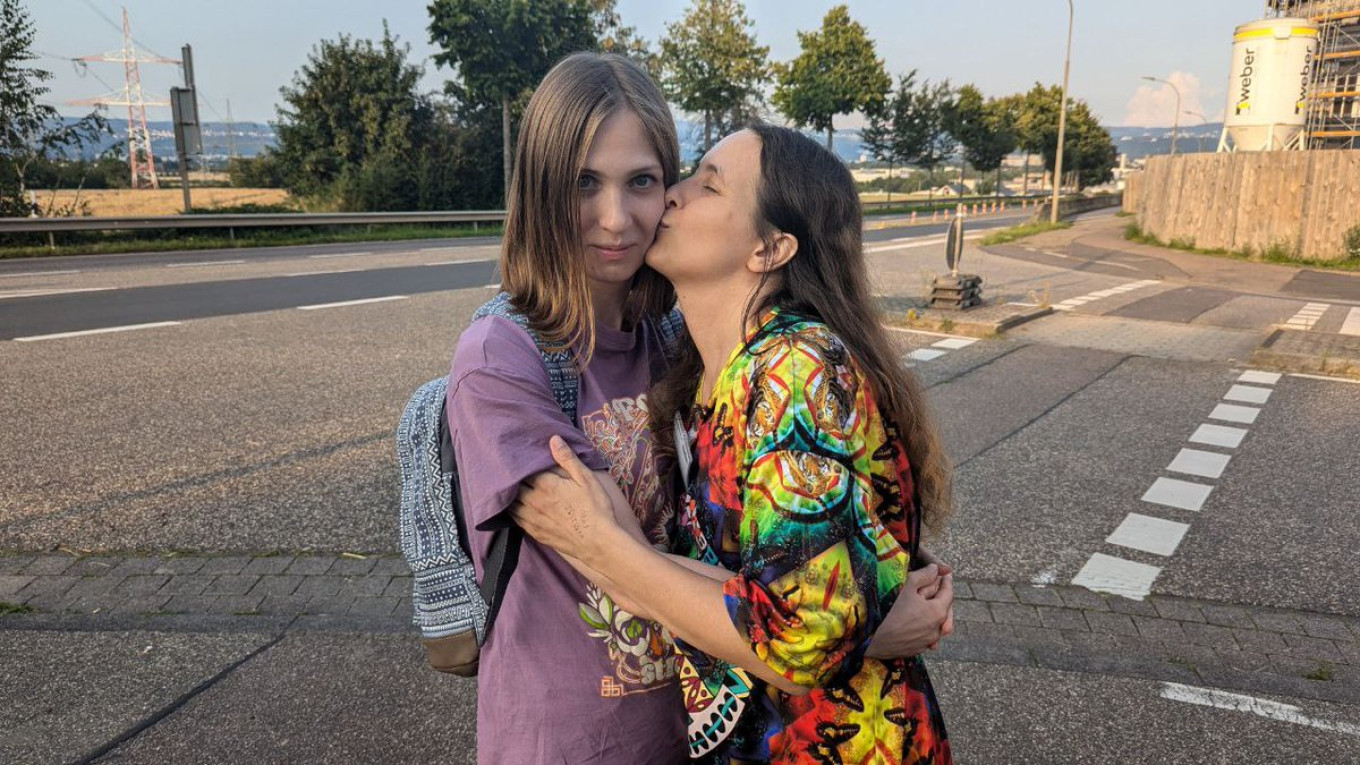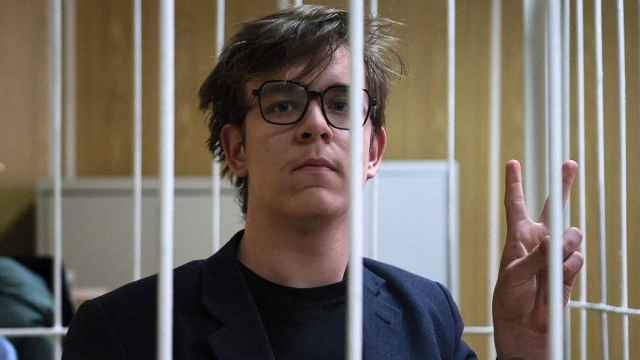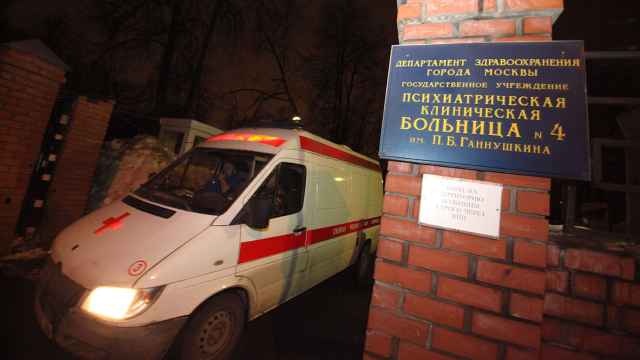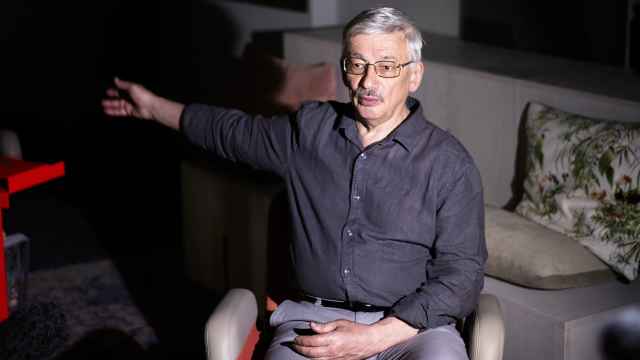St. Petersburg artist Sasha Skochilenko was sentenced to seven years in prison last year for spreading “fake news” about the Russian army after she replaced supermarket price tags with statements criticizing the invasion of Ukraine and the killing of Ukrainian civilians.
Defending her actions in a court hearing ahead of her sentencing, the 33-year-old Skochilenko told the judge that she believes “life is sacred.”
At the same time, her own life was at risk. She suffers from health conditions including celiac disease, which requires a strict diet that was not always available in detention, as well as a congenital heart defect.
This month, Skochilenko became one of over a dozen political prisoners released by Moscow in a prisoner exchange between Russia and the West.
The Moscow Times spoke with Skochilenko and her girlfriend, Sofia Subbotina, who supported her throughout her trial, about the exchange and their future plans.
MT: Were you expecting to be included on the list of political prisoners up for exchange?
Alexandra Skochilenko: Not at all. That never even crossed my mind. There was hope when people started talking about a possible exchange at the beginning of 2024. I hoped it might happen. But being part of that exchange was a dream. I never really believed I could actually get on that plane. I’m still surprised by it.
Before the exchange, I sometimes imagined the darkest possible future, like getting seriously ill and dying in prison. That happens to people — it’s not uncommon. That was my biggest fear. At times, I felt despair and envisioned my future that way. But more often, I imagined that I would continue to find ways to cope, to adapt to prison life and find small joys in it. Another bad outcome I imagined was serving my entire sentence without being released on parole and being transferred to a distant colony, as has happened to some political prisoners.
But I also imagined more hopeful futures. For instance, that I might not serve my full term — each day [I spent] in pre-trial detention [before my sentencing] counted as a day and a half. Because of an appeal, we gained nine months in pre-trial detention [which would shorten my time in prison].
Sofia Subbotina: We didn’t know anything about the upcoming exchange until the very last minute. Sasha disappeared from her detention center and we were told she had most likely been taken to Moscow. That night, we booked train tickets and went to Moscow, to Lefortovo Prison. But they told us she wasn’t listed there [at Lefortovo]. We didn’t know what to think or what was happening. On Tuesday, we went around to different detention centers again, but with no results. But that evening, reports about the exchange started appearing everywhere. At that point, we began to feel some hope. But I was very scared for Sasha because I realized that we had been out of contact with her for three days.
On August 1, I knew I wanted to see Sasha as soon as possible. I booked a flight to Istanbul because there’s a huge airport with flights to every part of the world. I understood that I might be leaving the country forever. By the evening of August 1, everyone was saying that the political prisoners would likely be taken to Germany. So I booked a flight from Istanbul to Berlin. Just as I was boarding, while going through passport control, Sasha called me. They gave her a phone for only about 30 seconds. She said she’d been exchanged, that she was in Ankara and that her plane was flying to Cologne.
I was afraid I would cry a lot when I saw Sasha, but for some reason, that didn’t happen. We were just very happy to see each other. That same evening, Sasha was released from the hospital [where she had been in quarantine]. We went to a hotel and walked around for a long time that evening. There were, of course, a lot of emotions.
MT: What were the conditions like before the exchange?
AS: At Lefortovo [just before the exchange], I was very cold because, upon arrival, they took almost all of my belongings and gave me prison clothes.
I have very low blood pressure and anemia, so I was freezing. There were also problems with food because, although the doctor who examined me upon arrival noted that I have celiac disease, it seems they couldn’t arrange appropriate meals for me in time. Often, I couldn’t eat anything — for example, we would have porridge for breakfast, pasta for lunch and dinner. I was very hungry. Plus, the atmosphere there is quite tense, it’s scary to even make a noise.
Also, my rights were violated there. I couldn’t exercise my right to a one-hour walk, which is my right as a prisoner — they told me right away that there would be no walks. We also weren’t allowed to shower, even though women in prison are supposed to be able to shower twice a week. I couldn’t make calls or submit requests — they simply didn’t accept them. My loved ones were even told I wasn’t at Lefortovo while I was there.
MT: Do you know who lobbied to get you included on the list?
AS: I have no idea.
MT: How were your first days of freedom and what are your future plans?
AS: We stayed in a wonderful little German town. I worked on new drawings, bought supplies for my art. Now we’re heading to Berlin.
SS: Our plans for the future are simply to live. I want to continue human rights work. I really want to do whatever I can for the people who remain in Russia, for those in prison, and for their families. We plan to stay in Germany. We really like the country. We want to learn the language and build our new life here.
MT: Do you dream of returning to Russia someday?
AS: Of course, I do, but only as a visitor. My relationship with Russia was like being with an abuser. I’ve left that abusive relationship — why would I go back? Even if the regime changes, there will still be plenty of people who were involved in putting me in prison. Why would I return? But as a visitor, of course, I’d be happy to come back — though not anytime soon.
A Message from The Moscow Times:
Dear readers,
We are facing unprecedented challenges. Russia's Prosecutor General's Office has designated The Moscow Times as an "undesirable" organization, criminalizing our work and putting our staff at risk of prosecution. This follows our earlier unjust labeling as a "foreign agent."
These actions are direct attempts to silence independent journalism in Russia. The authorities claim our work "discredits the decisions of the Russian leadership." We see things differently: we strive to provide accurate, unbiased reporting on Russia.
We, the journalists of The Moscow Times, refuse to be silenced. But to continue our work, we need your help.
Your support, no matter how small, makes a world of difference. If you can, please support us monthly starting from just $2. It's quick to set up, and every contribution makes a significant impact.
By supporting The Moscow Times, you're defending open, independent journalism in the face of repression. Thank you for standing with us.
Remind me later.







